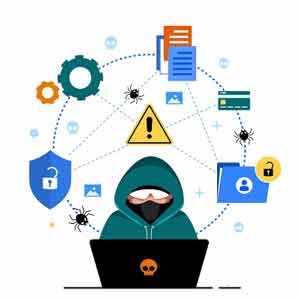Cyber Security Testing Services
- November 24, 2022
- Posted by: admin
- Category: Information Security
Cyber Security Testing Services
Technology has become an integral part of our lives, and with that comes increased risks to our personal and professional lives. Cyber security threats are constantly evolving, and it can be difficult to keep up with the latest trends. That’s where cyber security testing services come in. These services help identify vulnerabilities in your systems and provide recommendations on how to fix them. They can also help train your staff on proper cyber security practices. In this blog post, we’ll explore the benefits of cyber security testing services and how they can help protect your business.

What is Cyber Security Testing?
Cyber security testing is the process of assessing the security of a computer system or network. It can be done manually or using automated tools. Cyber security testing assesses the confidentiality, integrity, and availability of data and systems. It covers a wide range of tests, including penetration testing, vulnerability assessment, incident response testing, and forensics.
The Different Types of Cyber Security Testing Services
There are many different types of cybersecurity testing services available. Some companies offer a comprehensive suite of services, while others specialize in specific areas such as penetration testing or application security testing. Here is a brief overview of the most common types of services offered:
-Penetration Testing: A penetration test, also known as a pen test, is an authorized simulated attack on a computer system to evaluate the security of the system. The goal of a pen test is to identify vulnerabilities that could be exploited by an attacker.
-Application Security Testing: Application security testing assesses the security of applications and interfaces between systems. It includes tests such as input validation testing, authentication, and authorization testing, and session management testing.
-Infrastructure Security Testing: Infrastructure security testing evaluates the security of networks, servers, and devices. It includes tests such as network scanning, vulnerability assessment, and social engineering.
-Wireless Security Testing: Wireless security testing assesses the security of wireless networks and devices. It includes tests such as wireless network discovery, encryption strength testing, and signal strength testing.
Pros and Cons of Cyber Security Testing
Cyber security testing is the process of assessing the security of a computer system or network. It can be used to find vulnerabilities in systems and networks, as well as to test the strength of security controls. Cybersecurity testing can be done manually or automatically, and it is an important part of any organization’s security program.
There are both advantages and disadvantages to cyber security testing. Some of the pros include:
– Finding vulnerabilities before attackers do: By testing for weaknesses, organizations can find and fix them before they are exploited by malicious actors.
– Improving security posture: Regular testing can help an organization identify where its security needs improvement, and make changes to reduce overall risk.
– Meeting compliance requirements: In some industries, such as finance, regular cyber security testing may be required by regulators.
Some of the potential cons of cyber security testing include:
– false positives: Sometimes tests may identify potential vulnerabilities that turn out not to be actual risks. This can waste time and resources chasing down phantom threats.
– Generating too much data: Some tests can generate a large volume of data that can be difficult to sift through and make sense of. This can lead to information overload and make it harder to identify real threats.
– disruptions to business operations: Testing can sometimes cause disruptions to normal business operations, depending on how and when it is conducted. This may require advance planning to minimize negative impacts.
What to Look for in a Cyber Security Testing Service Provider
When it comes to choosing a cyber security testing service provider, there are a few key factors you should keep in mind. Here are a few things to look for when selecting a provider:
-A provider that offers a comprehensive suite of services: A good cyber security testing service provider will offer a wide range of services, from penetration testing and vulnerability assessments to application security testing and incident response. This way, you can be sure that your organization’s data and systems are well-protected against all types of threats.
-A provider with extensive experience: Choose a provider that has extensive experience in the field of cyber security. This way, you can be confident that they have the knowledge and expertise to effectively protect your data and systems.
-A provider with a proven track record: Look for a provider that has a proven track record in providing cyber security testing services. This way, you can be sure that they have the ability to deliver on their promises.
How to Choose the Right Cyber Security Testing Service Provider
When it comes to choosing a cyber security testing service provider, there are a few key factors you need to keep in mind. Here are a few tips on how to choose the right provider for your needs:
1. Make sure the provider has experience in conducting various types of tests.
2. Inquire about the tools and methods they use for testing.
3. Ask about their reporting capabilities and how they communicate results.
4. Find out what type of customer support they offer.
5. Get quotes from several providers and compare prices.
Alternatives to Cyber Security Testing Services
There are a number of alternatives to cyber security testing services that can be used to protect your computer systems and data. These include:
1. Implementing a strong cyber security policy within your organisation. This should include clear guidelines on what employees can and cannot do online, as well as how to report any suspicious activity.
2. Training your staff in basic cyber security principles. They should know how to spot phishing emails, for example, and understand the importance of keeping their passwords secure.
3. Using anti-virus and anti-malware software, and keeping it up-to-date. This will help to protect your systems from known threats.
4. Keeping your software and operating system up-to-date with the latest security patches. This will help to close any vulnerabilities that could be exploited by hackers.
5. Regularly backing up your data onto a secure server or cloud storage service. This way, if your systems are compromised, you will be able to restore them from a previous backup.
Conclusion
There are a lot of cyber security testing services out there, but not all of them are created equal. It’s important to do your research and find a service that is right for you and your needs. We hope that our overview of the top three services has helped you narrow down your options and find the best fit for your business. Thanks for reading!


